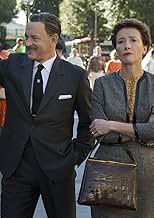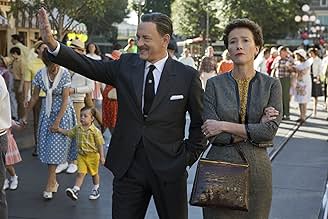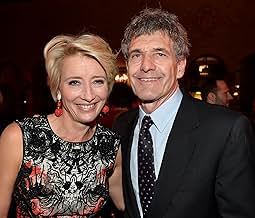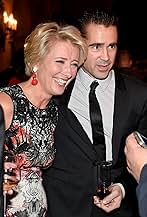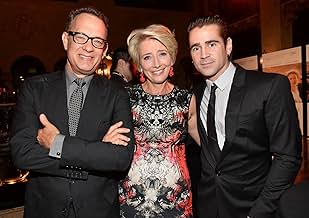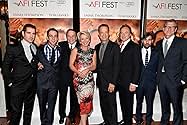La autora P.L. Travers reflexiona sobre su infancia después de reunirse con Walt Disney, quien busca adaptar sus libros de Mary Poppins para la gran pantalla.La autora P.L. Travers reflexiona sobre su infancia después de reunirse con Walt Disney, quien busca adaptar sus libros de Mary Poppins para la gran pantalla.La autora P.L. Travers reflexiona sobre su infancia después de reunirse con Walt Disney, quien busca adaptar sus libros de Mary Poppins para la gran pantalla.
- Dirección
- Guionistas
- Elenco
- Nominado a 1 premio Óscar
- 13 premios ganados y 74 nominaciones en total
Fuschia Sumner
- Flight Attendant
- (as Fuschia Kate Sumner)
- Dirección
- Guionistas
- Todo el elenco y el equipo
- Producción, taquilla y más en IMDbPro
Opiniones destacadas
Saving Mr Banks tells the story of Walt Disney's battle to get the rights to make Mary Poppins into a movie. I wasn't expecting to like this but was completely blown away.
It is beautifully put together, is hilarious in parts and very touching and emotional at other stages, but is not overly sappy or cheesy.
There are some outstanding performances here. Emma Thompson plays Mrs Travers beautifully - a cantankerous and stubborn lady, yet you can't dislike her. Tom Hanks does a good job of playing Walt Disney - a tough role for anyone but he seems to suit it, so long as you can get past the terrible fake southern accent which is worse than Dick Van Dyke's attempts at an English accent in Mary Poppins.
However the stand-out performance is, surprisingly, delivered by Colin Farrell as Mrs Travers' father. He brings amazing range and emotion to a character that is simultaneously a loving, sweet father and a man caged in by life and personal demons.
Go see it for yourself when it comes out at the end of November. I'm looking forward to watching it again.
It is beautifully put together, is hilarious in parts and very touching and emotional at other stages, but is not overly sappy or cheesy.
There are some outstanding performances here. Emma Thompson plays Mrs Travers beautifully - a cantankerous and stubborn lady, yet you can't dislike her. Tom Hanks does a good job of playing Walt Disney - a tough role for anyone but he seems to suit it, so long as you can get past the terrible fake southern accent which is worse than Dick Van Dyke's attempts at an English accent in Mary Poppins.
However the stand-out performance is, surprisingly, delivered by Colin Farrell as Mrs Travers' father. He brings amazing range and emotion to a character that is simultaneously a loving, sweet father and a man caged in by life and personal demons.
Go see it for yourself when it comes out at the end of November. I'm looking forward to watching it again.
As with 'The Day of the Jackal', anyone with a basic knowledge of history will know how this ends; just as anyone familiar with the film that eventually emerged from this 1961 meeting of an irresistible force and an immovable object will know both the outcome and who won the creative battles.
We actually learn early on when she laments that "I want to keep my house" that Disney had Travers over a barrel; while the fact that there was never a sequel to 'Mary Poppins' tells us all we need to know about what she actually thought of the film that emerged!
We actually learn early on when she laments that "I want to keep my house" that Disney had Travers over a barrel; while the fact that there was never a sequel to 'Mary Poppins' tells us all we need to know about what she actually thought of the film that emerged!
"Saving Mr. Banks" is an exquisite film. It draws you in with the delightful reality of Disney as well as the triumphantly stark reality (inasmuch as it is reality; I do lack her background) of Mrs. Travers. I purposely leave out parts of the film for the sake of the movie-goer, but let me say how delightful the songs are, the people are, the displays of emotion-- my part as well, as I nearly cried and fully laughed at certain points throughout. The film speaks to me and it feels complete in its currency-- tuppence, if you will-- in taking Mrs. Travers' story and embellishing it with the truth of the creators' (both Travers and Disney, for the part he has in the creation of the film) lives. The lives of the characters-- and I do mean most people seen on screen, in particular the driver and Mrs. Travers' mother-- are well-told and well-lived, and spark a certain comfort and warmth, even in the cold of their realities and harsher backstories. I believe the film has done its job beautifully, and I wouldn't change it for the world. Even the animated penguins, although for me there is still my deep and abiding love for their real counterparts.
Walt Disney Pictures rarely aims for the Best Picture crown, being more a company focused on profits and sustaining its wildly popular brand. To make you haters hate more: they've earned $4 billion this year already and this includes the $200 million loss of Lone Ranger). They usually only distribute the movies that have a shot at Academy Awards immortality, with The Help (A Dreamworks film) being the latest example of a nominee and No Country For Old Men being their latest example of a winner.
But with Saving Mr. Banks, Disney is going the whole nine yards. With a stellar cast, seemingly endless budget (Giving John Lee Hancock a much-less stressful job in directing), high production value, and heavy dosage of drama that hides beneath the happier movie trailers, this film stands as one of the better dramas of the year and a sure-fire Oscar-contender. Touching upon the tissue-happy themes of forgiveness, family, and seeking happiness in a miserable world, prepare for waterworks throughout the two hours.
What makes this movie work more than anything else is the screenplay that didn't start in the studios of Disney, allowing for a more accurate portrayal of the true story behind the making of the masterpiece Mary Poppins----even if the entire world knows that with the backing of Disney some details will be left out. Kelly Marcel and Sue Smith weaved out an engaging story full of crisp dialogue and skillfully avoids becoming too overblown or too overdramatic. And whenever the movie gets close to being all-out depressing, we get treated to humorous moments here and there to keep the audience in check.
In a movie about artists that are addicted to their craft, you need actors that work with the same type of fervor. Emma Thompson despite not getting top billing gets the most screen time, gets the toughest job, and delivers the ultimate performance. She becomes very dislikable and yet sympathetic at the same time, and it is impossible to see anyone other than Thompson deliver this type of impact. Tom Hanks in an Oscar-baiting year does a superb job portraying the icon planet Earth knows and loves as he gives Walt Disney a humanized performance that separates the flawed man from the myth the Disney Company has feverishly worked to this day to protect. The rest of the cast does not disappoint, and we even see Colin Farrell potentially impress some Academy voters as the loving yet extremely defective father figure.
Disney's protection of its brand is the sole reason why Saving Mr. Banks could never ever ever ever ever ever be produced or made by anybody else. But luckily for all viewers, Disney doesn't pull back many punches in delivering the story behind the complex and conflicted making of Mary Poppins. It will be deep in the Golden Globes and the Academy Awards but ultimately indeed deserves the praise—even if you won't see all the details behind the true story on screen.
But with Saving Mr. Banks, Disney is going the whole nine yards. With a stellar cast, seemingly endless budget (Giving John Lee Hancock a much-less stressful job in directing), high production value, and heavy dosage of drama that hides beneath the happier movie trailers, this film stands as one of the better dramas of the year and a sure-fire Oscar-contender. Touching upon the tissue-happy themes of forgiveness, family, and seeking happiness in a miserable world, prepare for waterworks throughout the two hours.
What makes this movie work more than anything else is the screenplay that didn't start in the studios of Disney, allowing for a more accurate portrayal of the true story behind the making of the masterpiece Mary Poppins----even if the entire world knows that with the backing of Disney some details will be left out. Kelly Marcel and Sue Smith weaved out an engaging story full of crisp dialogue and skillfully avoids becoming too overblown or too overdramatic. And whenever the movie gets close to being all-out depressing, we get treated to humorous moments here and there to keep the audience in check.
In a movie about artists that are addicted to their craft, you need actors that work with the same type of fervor. Emma Thompson despite not getting top billing gets the most screen time, gets the toughest job, and delivers the ultimate performance. She becomes very dislikable and yet sympathetic at the same time, and it is impossible to see anyone other than Thompson deliver this type of impact. Tom Hanks in an Oscar-baiting year does a superb job portraying the icon planet Earth knows and loves as he gives Walt Disney a humanized performance that separates the flawed man from the myth the Disney Company has feverishly worked to this day to protect. The rest of the cast does not disappoint, and we even see Colin Farrell potentially impress some Academy voters as the loving yet extremely defective father figure.
Disney's protection of its brand is the sole reason why Saving Mr. Banks could never ever ever ever ever ever be produced or made by anybody else. But luckily for all viewers, Disney doesn't pull back many punches in delivering the story behind the complex and conflicted making of Mary Poppins. It will be deep in the Golden Globes and the Academy Awards but ultimately indeed deserves the praise—even if you won't see all the details behind the true story on screen.
From the studio that brought you Mary Poppins, Disney has released a biopic about the author of the original novels, P.L Travers. Saving Mr. Banks is the story of her battles with Walt Disney, who wants the rights to the film adaptation, in a dramatic comedy that is both witty and sentimental.
Mrs. Pamela P.L. Travers (Emma Thompson) has been hounded by Walt Disney (Tom Hanks) and the Disney Corporation for 20 years for the film rights to her book and she has refused constantly. But by 1961, she has run out of money and agrees to go to Los Angeles for two weeks to work with the writing team to see if a deal can be struck. Her conditions are that the film cannot be animated, there are no songs and she has final script approval. Travers quickly clashes with creative team and Walt himself, a man who promised his daughters he would adapt the book.
As this is going on Travers reflects on her childhood in rural Australia, with her father (Colin Farrell), a loving man who feeds his daughter's imagination, but an alcoholic with probable depression and how these events influenced her writing.
Saving Mr. Banks is a film armed with excellent screenplay and a top notch cast. As well as the likes of Thompson, Hanks and Farrell, Saving Mr. Banks also features Bradley Whittaker, Jason Schwartzman, Paul Giamatti, B.J. Novak and Ruth Wilson. They all offer strong performances and have given us very well defined characters. Thompson dominates as Travers, a no nonsense woman with poor social skills and a British Bulldog stubbornness/determination and injects a deadpan humour with the witty lines she was given. Thompson also brings out the emotion, the serious aspects of the character, as the shadows of her past still linger over her.
One of the big themes of the film is the writing process, both the individual, personal aspect and the collaborative effect of a film adaptation. Saving Mr. Banks shows that many writers use they personal experience and life and become a part of the author. It is hard for writers to let go and particularly for Travers, as she has so much invested in Mary Poppins, so much of herself in it. Her books allowed her to have some wish fulfilment.
The screenwriters Kelly Marcel and Sue Smith, director John Lee Hancock and editor Mark Livoisi worked brilliant to blending the story of Travers butting heads with Disney's creative team and her backstory about her childhood influencing her writing. There are plenty of transitions, allowing Hancock to have some fancy pans. One particular noticeable sequence is when the creative team performs one of the songs and Travers has a flashback. The film slowly reveals how Travers childhood and her father became a part of her writing, used in the books and become a part of the themes of her books and philosophies. This is particularly the case with her parents and their inabilities to cope, both Travers' father's alcoholism and mother's inability to cope with the stress, leading to her theme of responsibility. For a film that is about the writing process, Saving Mr. Banks never really shows about the writing process that Travers goes through, but explores the writing process of adapting a work, from one medium to another.
The final theme and a big part of the comedy comes from the clashes of cultures and personalities. Travers is a brash personality with formal, conservative approach and lives a modest lifestyle in London and a rustic life in Australia. This in comparison to the overtly friendly American and their glamour and excess, from the fashion to the food, particularly sweet treats and the hard sell from Disney in Travers' hotel room.
Saving Mr. Banks has a excellent screenplay, solid direction and balances the comedy dramatic portions extremely well. The film makes sure there is plenty of sentiment, particularly with the score by Thomas Newman. It is a safe film, but still a pleasing experience. It is perfect if you are a fan of Mary Poppins and you will have the songs stuck in your head.
Please visit www.entertainmentfuse.com
Mrs. Pamela P.L. Travers (Emma Thompson) has been hounded by Walt Disney (Tom Hanks) and the Disney Corporation for 20 years for the film rights to her book and she has refused constantly. But by 1961, she has run out of money and agrees to go to Los Angeles for two weeks to work with the writing team to see if a deal can be struck. Her conditions are that the film cannot be animated, there are no songs and she has final script approval. Travers quickly clashes with creative team and Walt himself, a man who promised his daughters he would adapt the book.
As this is going on Travers reflects on her childhood in rural Australia, with her father (Colin Farrell), a loving man who feeds his daughter's imagination, but an alcoholic with probable depression and how these events influenced her writing.
Saving Mr. Banks is a film armed with excellent screenplay and a top notch cast. As well as the likes of Thompson, Hanks and Farrell, Saving Mr. Banks also features Bradley Whittaker, Jason Schwartzman, Paul Giamatti, B.J. Novak and Ruth Wilson. They all offer strong performances and have given us very well defined characters. Thompson dominates as Travers, a no nonsense woman with poor social skills and a British Bulldog stubbornness/determination and injects a deadpan humour with the witty lines she was given. Thompson also brings out the emotion, the serious aspects of the character, as the shadows of her past still linger over her.
One of the big themes of the film is the writing process, both the individual, personal aspect and the collaborative effect of a film adaptation. Saving Mr. Banks shows that many writers use they personal experience and life and become a part of the author. It is hard for writers to let go and particularly for Travers, as she has so much invested in Mary Poppins, so much of herself in it. Her books allowed her to have some wish fulfilment.
The screenwriters Kelly Marcel and Sue Smith, director John Lee Hancock and editor Mark Livoisi worked brilliant to blending the story of Travers butting heads with Disney's creative team and her backstory about her childhood influencing her writing. There are plenty of transitions, allowing Hancock to have some fancy pans. One particular noticeable sequence is when the creative team performs one of the songs and Travers has a flashback. The film slowly reveals how Travers childhood and her father became a part of her writing, used in the books and become a part of the themes of her books and philosophies. This is particularly the case with her parents and their inabilities to cope, both Travers' father's alcoholism and mother's inability to cope with the stress, leading to her theme of responsibility. For a film that is about the writing process, Saving Mr. Banks never really shows about the writing process that Travers goes through, but explores the writing process of adapting a work, from one medium to another.
The final theme and a big part of the comedy comes from the clashes of cultures and personalities. Travers is a brash personality with formal, conservative approach and lives a modest lifestyle in London and a rustic life in Australia. This in comparison to the overtly friendly American and their glamour and excess, from the fashion to the food, particularly sweet treats and the hard sell from Disney in Travers' hotel room.
Saving Mr. Banks has a excellent screenplay, solid direction and balances the comedy dramatic portions extremely well. The film makes sure there is plenty of sentiment, particularly with the score by Thomas Newman. It is a safe film, but still a pleasing experience. It is perfect if you are a fan of Mary Poppins and you will have the songs stuck in your head.
Please visit www.entertainmentfuse.com
¿Sabías que…?
- TriviaP.L. Travers never did warm up to the song "Let's Go Fly a Kite" as depicted in this movie. According to Richard M. Sherman, it was "Feed the Birds" that won her over.
- ErroresThe other drivers at the airport hold signs bearing logos of Warner Brothers and MGM adopted sometime after 1961.
- Citas
Walt Disney: George Banks and all he stands for will be saved. Maybe not in life, but in imagination. Because that's what we storytellers do. We restore order with imagination. We instill hope again and again and again.
- Créditos curiososThe credits also have an actual audio recording of P.L. Travers conversing with the filmmakers like the ones depicted in the film.
- Bandas sonorasChim, Chim, Cher-ee
Written by Richard M. Sherman (as Richard Sherman) and Robert B. Sherman (as Robert Sherman)
Performed by Randy Kerber
Selecciones populares
Inicia sesión para calificar y agrega a la lista de videos para obtener recomendaciones personalizadas
Detalles
- Fecha de lanzamiento
- Países de origen
- Sitio oficial
- Idioma
- También se conoce como
- Saving Mr. Banks
- Locaciones de filmación
- Productoras
- Ver más créditos de la compañía en IMDbPro
Taquilla
- Presupuesto
- USD 35,000,000 (estimado)
- Total en EE. UU. y Canadá
- USD 83,301,580
- Fin de semana de estreno en EE. UU. y Canadá
- USD 413,373
- 15 dic 2013
- Total a nivel mundial
- USD 117,867,984
- Tiempo de ejecución2 horas 5 minutos
- Color
- Mezcla de sonido
- Relación de aspecto
- 2.39 : 1
Contribuir a esta página
Sugiere una edición o agrega el contenido que falta







